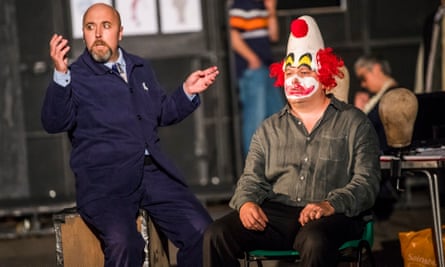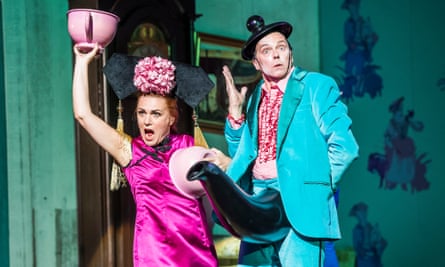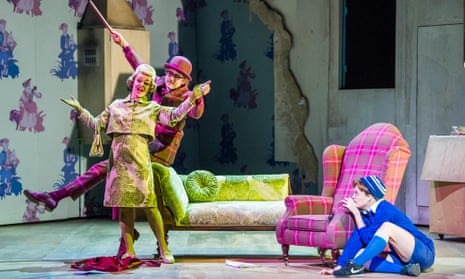For its autumn season, Opera North is reverting to a format first used in 2004 with a programme of “Little Greats” – six short works that each last around an hour, some more familiar than others, each engrossing in its own way. For the opening run in Leeds, they have been given standalone performances that can be booked individually, with two, three or four works being performed on each day; you could see all six in one weekend towards the end of October. For the subsequent tour, they are ticketed as double bills, although you will be able to catch Ravel’s L’Enfant et les Sortilèges on its own at a series of matinees.
The programming feels more cautious than 13 years ago, when there were eight operas and a higher proportion of little-known works, including Bizet’s Djamileh and Falla’s La Vida Breve. This season, Bernstein’s Trouble in Tahiti is the only genuine rarity, although Janáček’s Osud has not received a major new UK production since Garsington Opera staged it in 2002, and performances of Gilbert and Sullivan’s Trial By Jury have been relatively infrequent in recent years. Ravel’s exquisite phantasmagoria is familiar enough, as is that best-known of operatic pairings, Mascagni’s Cavalleria Rusticana and Leoncavallo’s Pagliacci. (When they are given side by side here, however, the traditional order is reversed, with Pagliacci placed first.)

The structure of the 2004 season was dictated by its directors, David Pountney and Christopher Alden, who staged four operas each. The unifying factor this time around is Charles Edwards, who has designed all six sets. He also directs Pagliacci, which shared the first evening with Annabel Arden’s staging of L’Enfant. Edwards’ front cloth, used for both operas, shows the singers for the season assembled together. This is very much an ensemble project, with Opera North having drawn its casts from company members and regular guest artists.
“You’ll see a company rehearsing an opera,” Richard Burkhard’s Tonio tells us in the Pagliacci prologue, which is sung in English before the opera is given in Italian. The front cloth rises on a modern-day rehearsal studio, where Peter Auty’s singer-director Canio is taking a model showing. Edwards’ designs for the remaining five operas are pinned to the studio walls; the grandfather clock from L’Enfant can be seen among assorted bits of furniture. Staging the opera as a series of rehearsals is ingenious, but strains against the narrative in places. Silvio (Phillip Rhodes) has become the company’s conductor, drilling the chorus in their numbers and accompanying Elin Pritchard’s Nedda as she tries out Stridono Lassù with a score.
The conceit leaves Tonio’s role unclear at times. The programme designates him “Canio’s designer”, yet he also appears in the opera-within-the-opera that we see on stage. Despite such moments of confusion, though, it is utterly compelling. At its best, the staging has the kind of furious, naturalistic power that one associates with Zola. Auty gives a great performance, singing with subtlety yet formidably conveying Canio’s psychological disintegration, while Pritchard captures superbly the cruelty that lurks beneath Nedda’s sensuality. It is wonderfully conducted by Tobias Ringborg, too.

Arden’s modern-dress L’Enfant, its costumes beautifully designed by Hannah Clark, takes a broadly psychoanalytic view, which has its roots in Melanie Klein’s 1929 study of the work, an extract from which is printed in the programme. We first see Wallis Giunta’s Child in a silent prologue, repeatedly ruining a family selfie, then playing with his iPad instead of doing his maths homework. The objects in his room that turn against him after a tantrum are linked subsequently to the family we saw at the start, so the Fire (Fflur Wyn) that now refuses to warm him looks like his slatternly, chain-smoking elder sister, while Arithmetic (John Graham-Hall), bombarding him with sums, is irritatingly avuncular.
This is less heavyweight than it sounds, thanks to Arden’s impeccable judgment of the work’s tone, which starts as comedy and darkens as the piece progresses. The foxtrot for the Teapot (Graham-Hall again) and Chinese Cup (Ann Taylor) had the first-night audience in fits, while Quirijn de Lang and Katie Bray make a stunning pair of cats. However, Arden glances throughout at the Child’s confused half-awareness of adult sexuality. When we leave his room for the garden, the magic turns increasingly troubling as he confronts John Savournin’s horribly wounded Tree and Rachel J Mosley’s Dragonfly, sorrowing for the mate the Child has killed. The singing is consistently fine. Giunta gives a deeply touching central performance and conductor Martin André brings the score beautifully to life.
How the season will develop remains to be seen. But these are exciting, provocative productions that augur well.
- At Grand theatre, Leeds, until 21 October. Box office: 0844-848 2700. Then touring until 18 November.

Comments (…)
Sign in or create your Guardian account to join the discussion